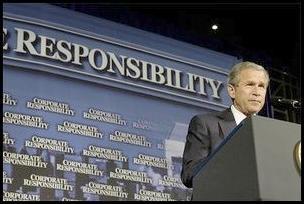From Time:A decorated Army officer reveals new allegations of detainee mistreatment in Iraq and Afghanistan. Did the military ignore his charges?By
ADAM ZAGORINThe U.S. Army has launched a criminal investigation into new allegations of serious prisoner abuse in Iraq and Afghanistan made by a decorated former Captain in the Army's 82nd Airborne Division, an Army spokesman has confirmed to TIME. The claims of the Captain, who has not been named, are in part corroborated by statements of two sergeants who served with him in the 82nd Airborne; the allegations form the basis of a report from Human Rights Watch obtained by TIME and due to be released in the next few days (Since this story first went online, the organization has decided to put out its report;
it can be found here). Senate sources tell TIME that the Captain has also reported his charges to three senior Republican senators: Majority Leader Bill Frist, Armed Services Committee chairman John Warner and John McCain, a former torture victim in Vietnam. A Senate Republican staffer familiar with both the Captain and his allegations told TIME he appeared "extremely credible."
The new allegations center around systematic abuse of Iraqi detainees by men of the 82nd Airborne at Camp Mercury, a forward operating base located near Fallujah, the scene of a major uprising against the U.S. occupation in April 2004, according to sources familiar with the report and accounts given by the Captain, who is in his mid-20s, to Senate staff. Much of the abuse allegedly occurred in 2003 and 2004, before and during the period the Army was conducting an internal investigation into the Abu Ghraib prison scandal, but prior to when the abuses at Abu Ghraib became public. Other alleged abuses described in the Human Rights report occurred at Camp Tiger, near Iraq's border with Syria, and previously in Afghanistan. In addition, the report details what the Captain says was his unsuccessful effort over 17 months to get the attention of military superiors. Ultimately he approached the Republican senators.
The Human Rights Watch report—as well as accounts given to Senate staff—describe officers as aware of the abuse but routinely ignoring or covering it up, amid chronic confusion over U.S. military detention policies and whether or not the Geneva Convention applied. The Captain is quoted in the report describing how military intelligence personnel at Camp Mercury directed enlisted men to conduct daily beatings of prisoners prior to questioning; to subject detainees to strenuous forced exercises to the point of unconsciousness; and to expose them to extremes of heat and cold—all methods designed to produce greater cooperation with interrogators. Non-uniformed personnel—apparently working for the Central Intelligence Agency, according to the soldiers—also interrogated prisoners. The interrogators were out of view but not out of earshot of the soldiers, who overheard what they came to believe was abuse.
Specific instances of abuse described in the Human Rights Watch report include severe beatings, including one incident when a soldier allegedly broke a detainee's leg with a metal bat. Others include prisoners being stacked in human pyramids (unlike the human pyramids at Abu Ghraib, the prisoners at Camp Mercury were clothed); soldiers administering blows to the face, chest and extremities of prisoners; and detainees having their faces and eyes exposed to burning chemicals, being forced into stress positions for long periods leading to unconsciousness and having their water and food withheld.
Prisoners were designated as PUCs (pronounced "pucks")—or "persons under control." A regular pastime at Camp Mercury, the report says, involved off-duty soldiers gathering at PUC tents, where prisoners were held, and working off their frustrations in activities known as "F____a PUC" (beating the prisoner) and "Smoke a PUC" (forced physical exertion, sometimes to the point of collapse). Broken limbs and similar painful injuries would be treated with analgesics, the soldiers claim, as medical staff would fill out paperwork stating the injuries occurred during capture. Support for some of the allegations of abuse come from a sergeant of the 82nd Airborne who served in both Iraq and Afghanistan. Human Rights Watch quotes him as saying that, "To 'F____ a PUC' means to beat him up. We would give them blows to the head, chest, legs, and stomach, pull them down, kick dirt on them. This happened every day. To 'smoke' someone is to put them in stress positions until they get muscle fatigue and pass out. That happened every day. Some days we would just get bored so we would have everyone sit in a corner and then make them get in a pyramid. This was before Abu Ghraib but just like it. We did that for amusement.
"On their day off people would show up all the time," the sergeant continues in the HRW report. "Everyone in camp knew if you wanted to work out your frustration you show up at the PUC tent. In a way it was sport. The cooks were all U.S. soldiers. One day a sergeant shows up and tells a PUC to grab a pole. He told him to bend over and broke the guy's leg with a mini Louisville Slugger that was a metal bat. He was the cook."
The sergeant says that military intelligence officers would tell soldiers that the detainees "were bad" and had been involved in killing or trying to kill Americans, implying that they deserved whatever punishment they got. "I would be told, 'These guys were IED [improvised explosive device] trigger men last week.' So we would f___ them up. F___ them up bad ... At the same time we should be held to a higher standard. I know that now. It was wrong. There are a set of standards. But you gotta understand, this was the norm. Everyone would just sweep it under the rug ... We should never have been allowed to watch guys we had fought."
The Captain making the allegations, say those who have been in contact with him, gave lengthy statements to Human Rights Watch only after his attempts to report what he had seen and heard to his own chain of command, were met, he claims, with repeated brush-offs. He is currently in special forces training at Fort Bragg in North Carolina. The two non-commissioned officers served in both Iraq and Afghanistan, and likewise approached the watchdog group, but have not conferred with Senate staff. "The captain is a very sincere officer, and troubled by what he says he has seen," says another senior aide to a Republican senator. "Only an investigation can determine how accurate his account will prove to be."
The Human Rights Watch report describes the Captain, in particular, as deeply frustrated by his attempts to report the abuse to his own superiors, who repeatedly instructed him to keep quiet, to ignore what he'd seen and to consider the implications for his career. The Captain told Human Rights Watch and Senate staff that he had contacted legislators reluctantly, believing it was the only way he could get the army to take him seriously. He also said that "I knew something was wrong" as he watched Secretary of Defense Donald Rumsfeld on television in 2004 testifying before a Congressional committee that the U.S. was following the Geneva Convention to the letter in Iraq. The Monday morning after Rumsfeld's testimony, he told Human Rights Watch, "I approached my chain of command." Eventually, the captain says, he approached his company commander, battalion commander and representatives of the Judge Advocate Corps (the military justice system), trying in vain to get clarification of rules on prisoner treatment and the application of the Geneva Convention. At one point, the Captain asserts, his Company commander told him, in effect, "Remember the honor of the unit is at stake," and, "Don't expect me to go to bat for you on this issue ..."
The Captain also says he was told there were pictures of abuse that occurred at Camp Mercury similar to photos taken by Military Police at Abu Ghraib prison. It is not clear whether the Captain saw the pictures, but he has said, sources tell TIME, that the photos were so similar to what was depicted at Abu Ghraib that, when the scandal erupted, soldiers burned them out of fear that they too could be punished. The Captain has also told Senate staff that many of the actions he witnessed did not, at the time, violate his personal code of conduct. He was also under the impression that the conduct was in line with military policy. It was only later, Congressional sources tell TIME, that he became aware of what he regarded as a blatant contradiction in official U.S. policy. As the captain puts it, according to the report: "I witnessed violations of the Geneva Conventions that I knew were violations of the Geneva Conventions when they happened but I was under the impression that that was U.S. policy at the time. And as soon as Abu Ghraib broke and they had hearings in front of Congress, the Secretary of Defense testified that we followed the spirit of the Geneva Conventions in Afghanistan, and the letter of the Geneva Conventions in Iraq, and as soon as he said that I knew something was wrong. So I called some of my classmates [from West Point], confirmed what I was concerned about and then on that Monday morning I approached my chain of command ..."
An Army spokesman confirmed to TIME that a criminal investigation has begun into the allegations, and that the Captain has been given permission to speak to members of Congress about his concerns. Since the Abu Ghraib scandal became public, hundreds of cases of alleged abuse have emerged based on reports from the International Committee of the Red Cross, U.S. government documents, prisoner legal filings and other sources. The Army alone says it has conducted investigations into more than 400 allegations of detainee mistreatment. To date, more than 230 Army personnel have been dealt with in courts martial, non-judicial punishments and other administrative actions.
Related Stories From The TIME ARCHIVE
New Abuse Charges Could the abuse of prisoners in Iraq have gone beyond the beatings and sexual humiliation already alleged? Unreleased, classified parts of the report on prison abuse from Major General Anthony Taguba,... [6/28/2004]
Torture: a Worldwide Epidemic HUMAN RIGHTS Amnesty International details abuses in 98 countriesThe victim could be a child of twelve or a man of 60. He could be a factory worker or a missionary. He might have been pulled... [4/16/1984]
A Human Rights Scorecard It was three years ago that members of Congress first asked then Secretary of State Henry Kissinger if he could report on the condition of human rights in countries that receive U.S. aid. Kissinger... [3/28/1977]
Other Articles:Testimony on Abu Ghraibby THE NEW YORK TIMES23 Sep 2005 at 10:00pmPfc. Lynndie R. England's "overly compliant" personality made her incapable of making an independent judgment, a psychologist testified.
3 in 82nd Airborne Say Beating Iraqi Prisoners Was Routineby ERIC SCHMITT23 Sep 2005 at 10:00pmThe soldiers told a human rights group that prisoners had been beaten and abused to help gather intelligence and for amusement.
More Iraqis Tortured, Officer Says, Richard A. Serrano
More on 82nd AirTorture Squad, HumanRightsReport















